董亚芬大学英语精读(第三版)第1册教案-Unit3
- 格式:doc
- 大小:108.00 KB
- 文档页数:12
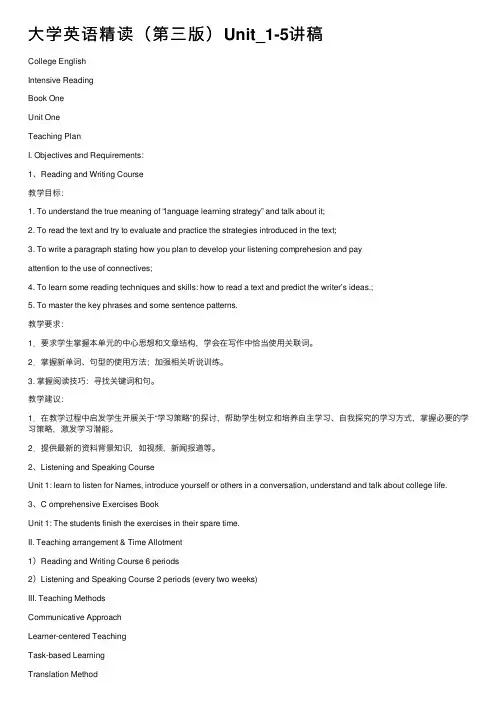
⼤学英语精读(第三版)Unit_1-5讲稿College EnglishIntensive ReadingBook OneUnit OneTeaching PlanI. Objectives and Requirements:1、Reading and Writing Course教学⽬标:1. To understand the true meaning of “language learning strategy” and talk about it;2. To read the text and try to evaluate and practice the strategies introduced in the text;3. To write a paragraph stating how you plan to develop your listening comprehesion and payattention to the use of connectives;4. To learn some reading techniques and skills: how to read a text and predict the writer’s ideas.;5. To master the key phrases and some sentence patterns.教学要求:1.要求学⽣掌握本单元的中⼼思想和⽂章结构,学会在写作中恰当使⽤关联词。
2.掌握新单词、句型的使⽤⽅法;加强相关听说训练。
3. 掌握阅读技巧:寻找关键词和句。
教学建议:1.在教学过程中启发学⽣开展关于“学习策略”的探讨,帮助学⽣树⽴和培养⾃主学习、⾃我探究的学习⽅式,掌握必要的学习策略,激发学习潜能。
2.提供最新的资料背景知识,如视频,新闻报道等。
2、Listening and Speaking CourseUnit 1: learn to listen for Names, introduce yourself or others in a conversation, understand and talk about college life.3、C omprehensive Exercises BookUnit 1: The students finish the exercises in their spare time.II. Teaching arrangement & Time Allotment1)Reading and Writing Course 6 periods2)Listening and Speaking Course 2 periods (every two weeks)III. Teaching MethodsCommunicative ApproachLearner-centered TeachingTask-based LearningTranslation MethodMultimedia ApproachIV. Presentation ProceduresLecture notesText: Some Strategies for Learning EnglishPart I. Background Information:1. Today’s English: Worldwide over 1.4 billion people live in countries where English has offical status. One out of five of the world’s population speaks some English. And at present one in five is learning English. With economic globalization and China’s opening up to the world, it has become increasingly important for the younger generation to master English. In a sense, English is not teachable, but learnable.2. Language learning strategies: They are used by learners to complete speaking, reading, vocabulary, listening or writing activities presented in language lessons. Recognizing that there is a task to complete or a problem to solve, language learners will use whatever strategies they possess to attend to the language-learning activity. Possible language learning strategies include: using practice opportunities, self-evaluation, selective attention, time management, reviewing notes taken in class and checking one’s understanding, constantly seeking answers to questions instead of passively receiving information, ect.3. Input-output balance theory in language learning:Input in language learning refers to information read, seen or heard by the learner, while output refers to what the learner produces in writing or speaking. The input-output balance theory in language learning believes that one can learn a language well through maintaining a balance between input and output.Part II. Warm-up Activities:Step 1. Ss Introduce themselves and talk about new college life.Step 2. Topic-centered Discussion(Group work)1.Do you enjoy learning English? Why or why not?2.What do you think is the most effective way of learning English?3.What is the greatest difficulty you have in your learning of English?Step 3. T makes a brief introduction to English learning and learning strategies.Part III. Text Analysis:Main Ideas: (Summary Writing)English as an international language is of vital importance for everybody to learn. Learning English is (绝⾮易事) by no means easy. Besides (持续的刻苦努⼒) sustained hard work, we need employ some learning strategies to (促进我们的学习) facilitate our learning.(我们应当以不同的⽅式对待⽣词) we should deal with new words in different ways. Active words demand constant practice while passive words only need to be recognized. As we try to understand the meaning of a word, we are also reminded of (它们的习惯⽤法) their idiomatic usage.Listening, speaking, reading and writing are the four basic skills that (我们不断努⼒试图获得的) we are constantly trying to acquire. In order to improve the four skills, we are suggested to listen to English every day, (抓住⼀切机会说英语) seize every opportunity to speak, read widely (难度适中的材料) materials at a proper level of difficulty and write regularly. Listening and reading (为我们提供语⾔输⼊) provide uswith language input and we are expected to (实际运⽤我们所学的东西) put what we have learned into practice through speaking and writing.Structure:A strategy refers to a set of carefully planned methods for achieving something that is difficult and may take a long time.In introducing some strategies, the author adopts the structure of Problem—Strategy within a paragraph to show us the problems in English learning and then proposes strategies to solve the problems. Please scan the text for some examples of the Problem—Strategy structure.Problems Strategies1. It is impossible to memorize 1. Deal with ative vocabulary and passive all the new words you are learning. vocabulary differently.2. Yo u don’t know the idiomatic 2. Watch out for not only the meaning of a usage of some words. word but also the way it is used in dailylife.3. You may not be able to catch a 3. Listen to it over and over again.lot after listening to a passagefor the first time.4. There are few situations for you 4. Seize every opportunity to speak English to practice speaking English at school. with or without a partner.Part IV. Learning points:1). Find out the active expressions:1. by no means not at all2. at fault responsible for something bad that has happened3. watch out for look out for; be on (one's) against4. seek out look for; try to find someone or something, especially whenthis is difficult5. put…into practice carry out or performTranslate the following into English:1. 我对⽬前的表现⼀点也不满意。
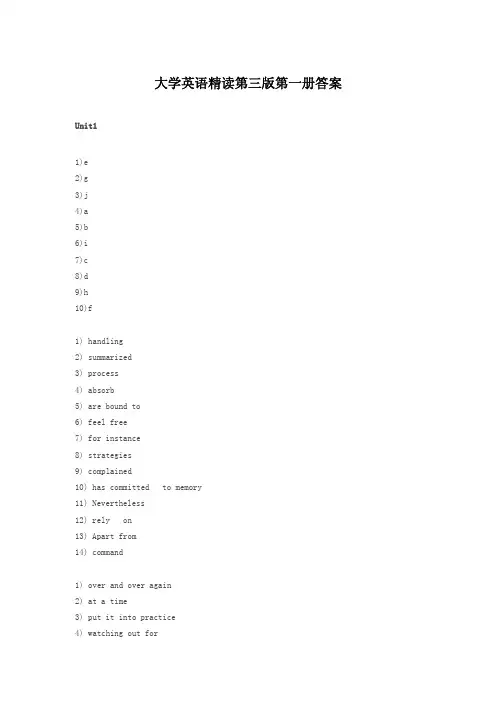
大学英语精读第三版第一册答案Unit11)e2)g3)j4)a5)b6)i7)c8)d9)h10)f1)handling2)summarized3)process4)absorb5)are bound to6)feel free7)for instance8)strategies9)complained10)has committed to memory11)Nevertheless12)rely on13)Apart from14)command1)over and over again2)at a time3)put it into practice4)watching out for5)by no means6)concentrate on7)In addition t8)in detail1)action2)employ3)announce4)examination5)communication6)express7)compose8)improvement9)concentration10)management11)consider12)motivate13)development14)movement15)discuss16)operate17)division18)production19)educate20)repeat1)additional2)add3)addition4)addition1)effectively2)effect3)effective4)effect1)helpful2)help3)helpless4)help5)helplessly6)helpfully7)helpful1)reliant2)reliable3)reliance reliable4)relies5)reliably6)1)repetition2)repeating3)repeatedly4)repeated5)repetition1)In my opinion2)According to Mary3)In our opinion4)According to today's papers5)In most doctors'opinion According to most doctors1)Shakespeare was not only a dramatist but also an actor.2)Miss Crain not only took me home in her car,but also came the next day to see if I had recovered.3)Hainan Island attracts tourists not only in winter but also in summer.4)There is always a black market not only in Britain,but also in other European countries.5)At the Athens Olympics in2004,Liu Xiang not only won a gold medal in the110-meter hurdles,but also broke the Olympic record.1)It is true that your sentences are all grammatically correct,but they don’t make any sense.2)It is true that they lost that battle,but they still went on fighting.3)It is true that Tom’s very clever and hardworking,but I still don’t think he is the right person for the job.4)It is true that learning English is by no means easy,but we can make the task easier by using some learning strategies.1)strategies2)frequently3)over and over again4)commit to memory5)acquaintance6)watch out for7)communicate8)process9)opportunities10)rely on11)put into practice12)absorbed1)if2)about3)it4)know5)up6)as7)addition8)even9)into10)other11)for12)while1)memorize2)a matter of3)taught4)shelf5)realize6)written7)idiomatic8)join in9)difference10)gain a good command翻译1)史密斯太太对我抱怨说,她经常发现与自己十六岁的女儿简直无法沟通。
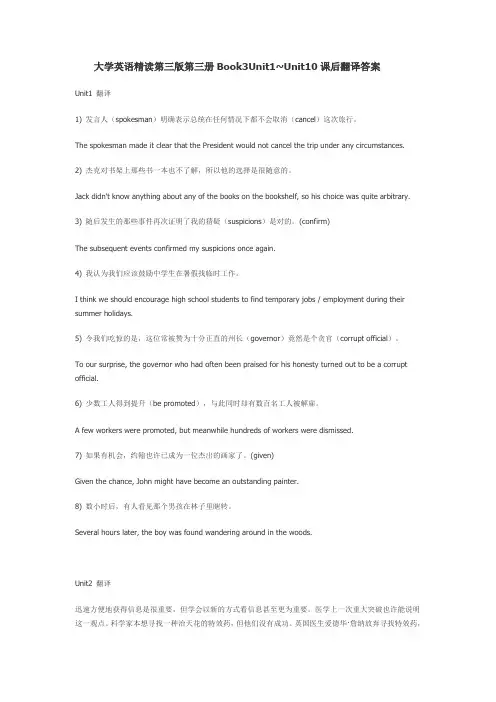
大学英语精读第三版第三册Book3Unit1~Unit10课后翻译答案Unit1 翻译1) 发言人(spokesman)明确表示总统在任何情况下都不会取消(cancel)这次旅行。
The spokesman made it clear that the President would not cancel the trip under any circumstances.2) 杰克对书架上那些书一本也不了解,所以他的选择是很随意的。
Jack didn't know anything about any of the books on the bookshelf, so his choice was quite arbitrary.3) 随后发生的那些事件再次证明了我的猜疑(suspicions)是对的。
(confirm)The subsequent events confirmed my suspicions once again.4) 我认为我们应该鼓励中学生在暑假找临时工作。
I think we should encourage high school students to find temporary jobs / employment during their summer holidays.5) 令我们吃惊的是,这位常被赞为十分正直的州长(governor)竟然是个贪官(corrupt official)。
To our surprise, the governor who had often been praised for his honesty turned out to be a corrupt official.6) 少数工人得到提升(be promoted),与此同时却有数百名工人被解雇。
A few workers were promoted, but meanwhile hundreds of workers were dismissed.7) 如果有机会,约翰也许已成为一位杰出的画家了。
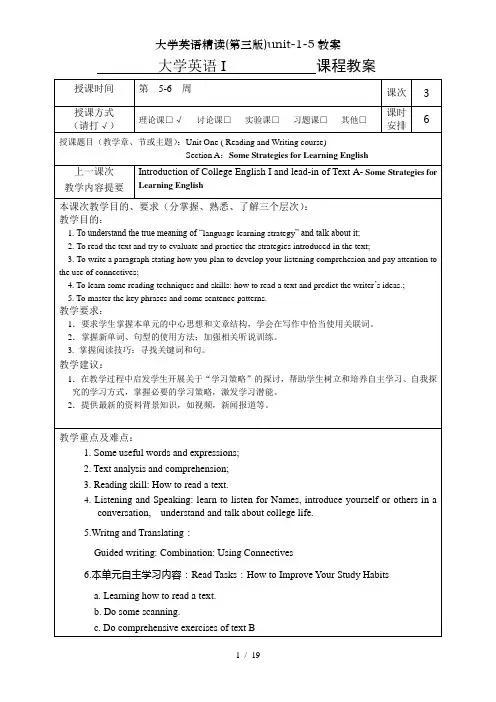
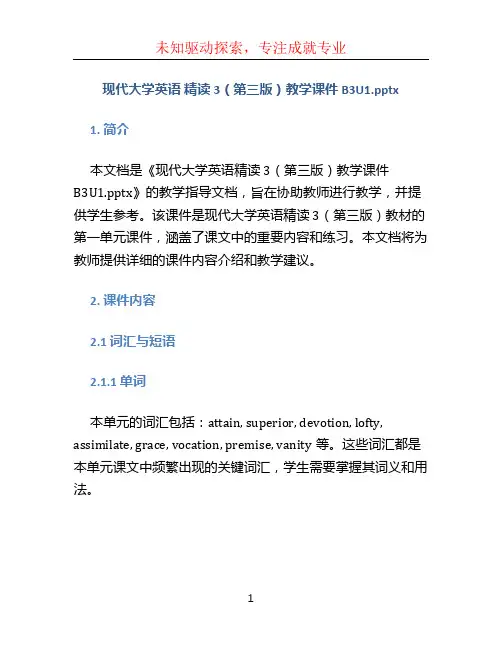
现代大学英语精读3(第三版)教学课件B3U1.pptx1. 简介本文档是《现代大学英语精读3(第三版)教学课件B3U1.pptx》的教学指导文档,旨在协助教师进行教学,并提供学生参考。
该课件是现代大学英语精读3(第三版)教材的第一单元课件,涵盖了课文中的重要内容和练习。
本文档将为教师提供详细的课件内容介绍和教学建议。
2. 课件内容2.1 词汇与短语2.1.1 单词本单元的词汇包括:attain, superior, devotion, lofty, assimilate, grace, vocation, premise, vanity等。
这些词汇都是本单元课文中频繁出现的关键词汇,学生需要掌握其词义和用法。
2.1.2 短语本单元的短语包括:be indicative of, bring out, take…seriously, measure up to, in good part等。
教师可以通过例句和实例来帮助学生理解这些短语的含义和用法。
2.2 阅读理解本单元的阅读理解部分涵盖了三篇文章,分别是《选择正确的途径》、《智慧的力量》和《忠诚的战士》。
教师可以通过课件中的题目和文字说明帮助学生理解文章内容,并进行讨论和解答相关问题。
2.3 语法与写作本单元的语法重点是介词和非谓语动词的用法。
教师可以利用课件中的例句和练习来讲解和巩固学生对这些语法知识的掌握。
此外,课件还包括写作部分,教师可以引导学生根据所学的语法知识写作相关的练习作文。
3. 教学建议3.1 教学方法教师可以采用多种教学方法来教授本单元内容,如讲解法、示范法和讨论法等。
在讲解词汇和短语时,可以先通过示范法来引导学生正确使用,然后进行讨论和实践。
在阅读理解部分,可以采用讨论法来引导学生分析文章内容,并提出自己的见解和观点。
在语法与写作部分,可以通过讲解法和实践法相结合,引导学生掌握语法知识,并培养写作能力。
3.2 学生活动教师应鼓励学生积极参与课堂活动,并提供一些学生活动的建议,如词汇卡片制作和交流、小组讨论、写作练习等。
![大学英语精读第三版(上海外语教育出版社 董亚芬主编)第一册答案[unit1-unit5]](https://uimg.taocdn.com/687e62eab8f67c1cfad6b89d.webp)
第一册Book1 Unit1答案1)e2)g3)j4)a5)b6)i7)c8)d9)h10)f1) handling2) summarized3) process4) absorb5) are bound to6) feel free7) for instance8) strategies9) complained 10) has committed tomemory11) Nevertheless12) rely on13) Apart from14) command1) over and over again2) at a time3) put it into practice4) watching out for5) by no means6) concentrate on7) In addition t8) in detail1)action2)employ3)announce4)examination5)communication6)express7)compose8)improvement9)concentration10)management11)consider12)motivate13)development14)movement15)discuss16)operate17)division18)production19)educate20)repeat1) additional2) add3) addition4) addition1) effectively2) effect3) effective4) effect1) helpful 2) help3) helpless4) help5) helplessly6) helpfully7) helpful1) reliant2) reliable3) reliance reliable4) relies5) reliably6)1) repetition2) repeating3) repeatedly4) repeated5) repetition1) In my opinion2) According to Mary3) In our opinion4) According to today's papers5) In most doctors' opinion According to most doctors1) Shakespeare was not only a dramatist but also an actor.2) Miss Crain not only took me home in her car, but also came the next day to see if I had recovered.3) Hainan Island attracts tourists not only in winter but also in summer.4) There is always a black market not only in Britain, but also in other European countries.5) At the Athens Olympics in 2004, Liu Xiang not only won a gold medal in the 110-meterhurdles, but also broke the Olympic record.1) It is true that your sentences are all grammatically correct, but they don’t make any sense.2) It is true that they lost that battle, but they still went on fighting.3) It is true that Tom’s very clever and hardworking, but I still don’t think he is the right person for the job.4) It is true that learning English is by no means easy, but we can make the task easier by using some learning strategies.1) strategies2) frequently3) over and over again4) commit to memory5) acquaintance6) watch out for7) communicate8) process9) opportunities10) rely on11) put into practice12) absorbed1) if 2) about3) it4) know5) up6) as7) addition8) even9) into10) other11) for12) while 1) memorize2) a matter of3) taught4) shelf5) realize 6) written7) idiomatic8) join in9) difference10) gain a good command翻译1) 史密斯太太对我抱怨说,她经常发现与自己十六岁的女儿简直无法沟通。
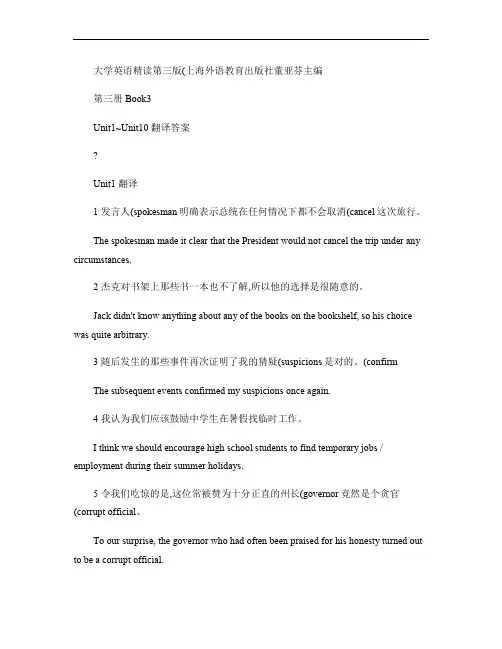
大学英语精读第三版(上海外语教育出版社董亚芬主编第三册Book3Unit1~Unit10 翻译答案?Unit1 翻译1 发言人(spokesman明确表示总统在任何情况下都不会取消(cancel这次旅行。
The spokesman made it clear that the President would not cancel the trip under any circumstances.2 杰克对书架上那些书一本也不了解,所以他的选择是很随意的。
Jack didn't know anything about any of the books on the bookshelf, so his choice was quite arbitrary.3 随后发生的那些事件再次证明了我的猜疑(suspicions是对的。
(confirmThe subsequent events confirmed my suspicions once again.4 我认为我们应该鼓励中学生在暑假找临时工作。
I think we should encourage high school students to find temporary jobs / employment during their summer holidays.5 令我们吃惊的是,这位常被赞为十分正直的州长(governor竟然是个贪官(corrupt official。
To our surprise, the governor who had often been praised for his honesty turned out to be a corrupt official.6 少数工人得到提升(be promoted,与此同时却有数百名工人被解雇。
A few workers were promoted, but meanwhile hundreds of workers were dismissed.7 如果有机会,约翰也许已成为一位杰出的画家了。
![大学英语精读第三版(上海外语教育出版社 董亚芬主编)第一册答案[unit1-unit5]](https://uimg.taocdn.com/687e62eab8f67c1cfad6b89d.webp)
第一册Book1 Unit1答案1)e2)g3)j4)a5)b6)i7)c8)d9)h10)f1) handling2) summarized3) process4) absorb5) are bound to6) feel free7) for instance8) strategies9) complained 10) has committed tomemory11) Nevertheless12) rely on13) Apart from14) command1) over and over again2) at a time3) put it into practice4) watching out for5) by no means6) concentrate on7) In addition t8) in detail1)action2)employ3)announce4)examination5)communication6)express7)compose8)improvement9)concentration10)management11)consider12)motivate13)development14)movement15)discuss16)operate17)division18)production19)educate20)repeat1) additional2) add3) addition4) addition1) effectively2) effect3) effective4) effect1) helpful 2) help3) helpless4) help5) helplessly6) helpfully7) helpful1) reliant2) reliable3) reliance reliable4) relies5) reliably6)1) repetition2) repeating3) repeatedly4) repeated5) repetition1) In my opinion2) According to Mary3) In our opinion4) According to today's papers5) In most doctors' opinion According to most doctors1) Shakespeare was not only a dramatist but also an actor.2) Miss Crain not only took me home in her car, but also came the next day to see if I had recovered.3) Hainan Island attracts tourists not only in winter but also in summer.4) There is always a black market not only in Britain, but also in other European countries.5) At the Athens Olympics in 2004, Liu Xiang not only won a gold medal in the 110-meterhurdles, but also broke the Olympic record.1) It is true that your sentences are all grammatically correct, but they don’t make any sense.2) It is true that they lost that battle, but they still went on fighting.3) It is true that Tom’s very clever and hardworking, but I still don’t think he is the right person for the job.4) It is true that learning English is by no means easy, but we can make the task easier by using some learning strategies.1) strategies2) frequently3) over and over again4) commit to memory5) acquaintance6) watch out for7) communicate8) process9) opportunities10) rely on11) put into practice12) absorbed1) if 2) about3) it4) know5) up6) as7) addition8) even9) into10) other11) for12) while 1) memorize2) a matter of3) taught4) shelf5) realize 6) written7) idiomatic8) join in9) difference10) gain a good command翻译1) 史密斯太太对我抱怨说,她经常发现与自己十六岁的女儿简直无法沟通。
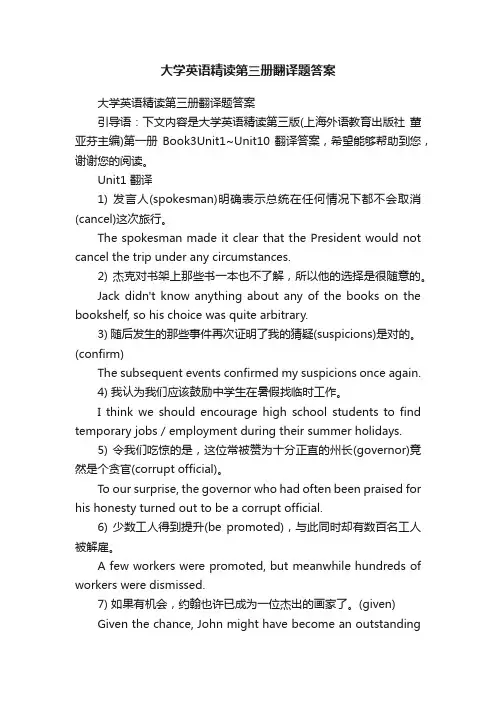
大学英语精读第三册翻译题答案大学英语精读第三册翻译题答案引导语:下文内容是大学英语精读第三版(上海外语教育出版社董亚芬主编)第一册Book3Unit1~Unit10 翻译答案,希望能够帮助到您,谢谢您的阅读。
Unit1 翻译1) 发言人(spokesman)明确表示总统在任何情况下都不会取消(cancel)这次旅行。
The spokesman made it clear that the President would not cancel the trip under any circumstances.2) 杰克对书架上那些书一本也不了解,所以他的选择是很随意的。
Jack didn't know anything about any of the books on the bookshelf, so his choice was quite arbitrary.3) 随后发生的那些事件再次证明了我的猜疑(suspicions)是对的。
(confirm)The subsequent events confirmed my suspicions once again.4) 我认为我们应该鼓励中学生在暑假找临时工作。
I think we should encourage high school students to find temporary jobs / employment during their summer holidays.5) 令我们吃惊的是,这位常被赞为十分正直的州长(governor)竟然是个贪官(corrupt official)。
To our surprise, the governor who had often been praised for his honesty turned out to be a corrupt official.6) 少数工人得到提升(be promoted),与此同时却有数百名工人被解雇。
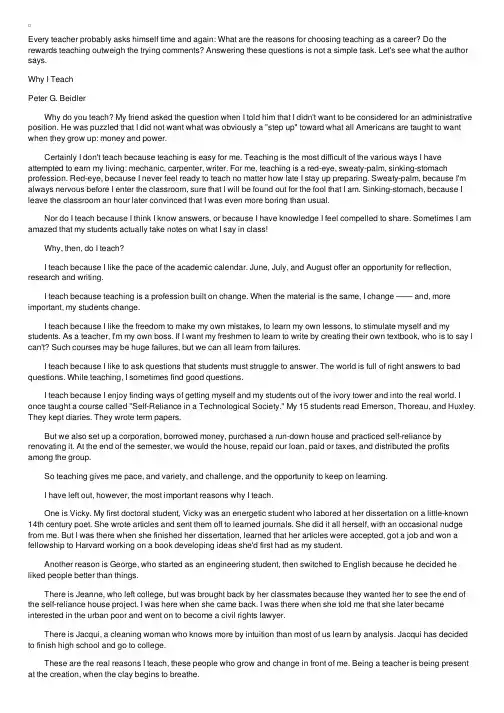
Every teacher probably asks himself time and again: What are the reasons for choosing teaching as a career? Do the rewards teaching outweigh the trying comments? Answering these questions is not a simple task. Let's see what the author says.Why I TeachPeter G. Beidler Why do you teach? My friend asked the question when I told him that I didn't want to be considered for an administrative position. He was puzzled that I did not want what was obviously a "step up" toward what all Americans are taught to want when they grow up: money and power. Certainly I don't teach because teaching is easy for me. Teaching is the most difficult of the various ways I have attempted to earn my living: mechanic, carpenter, writer. For me, teaching is a red-eye, sweaty-palm, sinking-stomach profession. Red-eye, because I never feel ready to teach no matter how late I stay up preparing. Sweaty-palm, because I'm always nervous before I enter the classroom, sure that I will be found out for the fool that I am. Sinking-stomach, because I leave the classroom an hour later convinced that I was even more boring than usual. Nor do I teach because I think I know answers, or because I have knowledge I feel compelled to share. Sometimes I am amazed that my students actually take notes on what I say in class! Why, then, do I teach? I teach because I like the pace of the academic calendar. June, July, and August offer an opportunity for reflection, research and writing. I teach because teaching is a profession built on change. When the material is the same, I change —— and, more important, my students change. I teach because I like the freedom to make my own mistakes, to learn my own lessons, to stimulate myself and my students. As a teacher, I'm my own boss. If I want my freshmen to learn to write by creating their own textbook, who is to say I can't? Such courses may be huge failures, but we can all learn from failures. I teach because I like to ask questions that students must struggle to answer. The world is full of right answers to bad questions. While teaching, I sometimes find good questions. I teach because I enjoy finding ways of getting myself and my students out of the ivory tower and into the real world. I once taught a course called "Self-Reliance in a Technological Society." My 15 students read Emerson, Thoreau, and Huxley. They kept diaries. They wrote term papers. But we also set up a corporation, borrowed money, purchased a run-down house and practiced self-reliance by renovating it. At the end of the semester, we would the house, repaid our loan, paid or taxes, and distributed the profits among the group. So teaching gives me pace, and variety, and challenge, and the opportunity to keep on learning. I have left out, however, the most important reasons why I teach. One is Vicky. My first doctoral student, Vicky was an energetic student who labored at her dissertation on a little-known 14th century poet. She wrote articles and sent them off to learned journals. She did it all herself, with an occasional nudge from me. But I was there when she finished her dissertation, learned that her articles were accepted, got a job and won a fellowship to Harvard working on a book developing ideas she'd first had as my student. Another reason is George, who started as an engineering student, then switched to English because he decided he liked people better than things. There is Jeanne, who left college, but was brought back by her classmates because they wanted her to see the end of the self-reliance house project. I was here when she came back. I was there when she told me that she later became interested in the urban poor and went on to become a civil rights lawyer. There is Jacqui, a cleaning woman who knows more by intuition than most of us learn by analysis. Jacqui has decided to finish high school and go to college. These are the real reasons I teach, these people who grow and change in front of me. Being a teacher is being present at the creation, when the clay begins to breathe. A "promotion" out of teaching would give me money and power. But I have money. I get paid to do what I enjoy: reading, talking with people, and asking question like, "What is the point of being rich?" And I have power. I have the power to nudge, to fan sparks, to suggest books, to point out a pathway. What other power matters? But teaching offers something besides money and power: it offers love. Not only the love of learning and of books and ideas, but also the love that a teacher feels for that rare student who walks into a teacher's life and begins to breathe. Perhaps love is the wrong word: magic might be better. I teach because, being around people who are beginning to breathe, I occasionally find myself catching my breath with them. NEW WORDS administrative a. of the management of affairs ⾏政的,管理的 administration n. 管理(部门),⾏政(机关) puzzle vt. fill with doubt and confusion 使迷惑 step (-) up n. promotion; increase in size, speed, etc. mechanic n. skilled workman, esp. one who uses or repairs machines and tools 机械⼯;机修⼯ sweaty a. covered with sweat, sweating palm a. ⼿掌 profession n. occupation, esp. one requiring special training, such as law, medicine, or teaching convince vt. make (sb.) feel certain; cause (sb.) to realize compel vt. force (sb. or sth. to do sth.) pace n. rate or speed of development, or in walking, etc. 速度;步速 calendar n. ⽇程表,⽇历 opportunity n. favourable occasion or chance reflection n. careful thinking; consideration 深思;考虑 reflect vi. stimulate vt. encourage; excite 刺激;激励 freshman n. student in his first year at a college or university failure n. a person, attempt, or thing that fails; lack of success ivory n. 象⽛ ivory tower n. place or condition of retreat from the world of action into a world of ideas and dreams 象⽛塔 self-reliance n. ability to do things and make decisions by oneself 依靠⾃⼰;⾃⼒更⽣ reliance n. trust, confidence; dependence 信赖;信⼼;依靠 technological a. of or related to technology 技术的 corporation n. (AmE)有限公司 run-down a. old and broken or in bad condition renovate vt. restore (old buildings, oil paintings, etc.) to a former, better state 修复,修整 semester n. (AmE) either of the two periods into which a school year is divided; term 学期 repay。
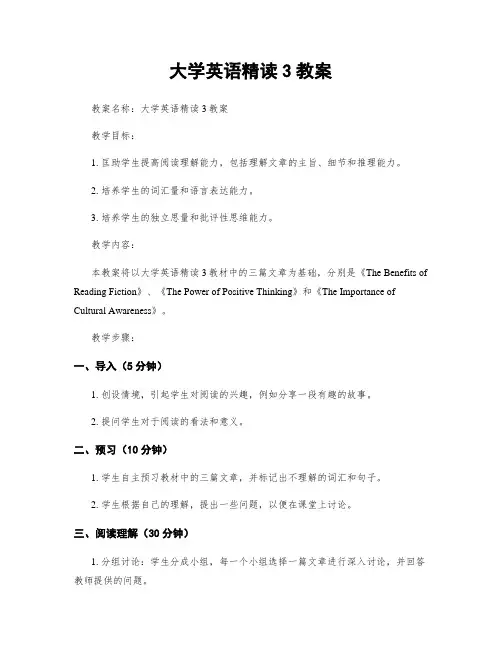
大学英语精读3教案教案名称:大学英语精读3教案教学目标:1. 匡助学生提高阅读理解能力,包括理解文章的主旨、细节和推理能力。
2. 培养学生的词汇量和语言表达能力。
3. 培养学生的独立思量和批评性思维能力。
教学内容:本教案将以大学英语精读3教材中的三篇文章为基础,分别是《The Benefits of Reading Fiction》、《The Power of Positive Thinking》和《The Importance of Cultural Awareness》。
教学步骤:一、导入(5分钟)1. 创设情境,引起学生对阅读的兴趣,例如分享一段有趣的故事。
2. 提问学生对于阅读的看法和意义。
二、预习(10分钟)1. 学生自主预习教材中的三篇文章,并标记出不理解的词汇和句子。
2. 学生根据自己的理解,提出一些问题,以便在课堂上讨论。
三、阅读理解(30分钟)1. 分组讨论:学生分成小组,每一个小组选择一篇文章进行深入讨论,并回答教师提供的问题。
2. 教师引导学生理解文章的主旨、段落结构和关键信息。
3. 教师解释不理解的词汇和句子,并匡助学生理解文章的难点。
四、词汇拓展(15分钟)1. 教师提供一些与文章相关的词汇,学生通过课堂讨论和举例的方式理解词汇的含义和用法。
2. 学生分组进行词汇游戏,巩固所学词汇。
五、语言表达(20分钟)1. 学生根据所学文章的内容,进行小组讨论,提出自己的观点和看法。
2. 学生展示自己的观点,进行辩论和交流,教师引导学生运用所学语言进行表达。
六、总结与反思(10分钟)1. 教师总结本节课的重点内容和学习收获。
2. 学生进行自我反思,回答教师提出的问题,例如:你对阅读有什么新的认识?你在本节课中遇到了哪些难点?你有什么需要改进的地方?教学评估:1. 教师观察学生在小组讨论和课堂表达中的参预度和理解程度。
2. 学生完成课后阅读理解题目,教师批改并赋予反馈。
教学资源:1. 大学英语精读3教材2. 阅读理解题目3. 词汇拓展材料4. 小组讨论和辩论的话题材料教学延伸:1. 学生可以通过阅读其他相关文章,拓宽自己的阅读素材和视野。
大学英语精读第三版(上海外语教育出版社董亚芬主编)第一册答案Book 1 Unit 1Study&Practice V ocabulary Activities1.1)e 2)g 3)j 4)a 5)b 6)i 7)c 8)d 9)h 10)f2.1) handling2) summarized3) process4) absorb5) are bound to6) feel free7) for instance8) strategies9) complained10) has committed... to memory11) Nevertheless12) rely... on13) Apart from14) command3.1) over and over again2) at a time3) put it into practice4) watching out for5) by no means6) concentrate on7) In addition to8) in detailEnriching Your Word Power1.1)action2)employ3)announce4)examination5)communication6)express7)compose8)improvement9)concentration10)management11)consider12)motivate13)development14)movement15)discuss16)operate17)division18)production19)educate20)repeat2.1) a) additional b) add c) addition d) addition2) a) effectively b) effect c) effective d) effect3) a)helpful b) help c) helpless d) help e) helplessly f) helpfully g) helpful4) a) reliant b) reliable c) reliance, reliable d) relies e) reliably5) a) repetition b) repeating c) repeatedly d) repeated e) repetitionUsage1) In my opinion2) According to Mary3) In our opinion4) According to today’s papers5) In most doctors’ opinion ( According to most doctors)Structure1.1) Shakespeare was not only a dramatist but also an actor.2) Miss Crain not only took me home in her car, but also came the next day to see if I had recovered.3) Hainan Island attracts tourists not only in winter but also in summer.4) There is always a black market not only in Britain, but also in other European countries.5) At the Athens Olympics in 2004, Liu Xiang not only won a gold medal in the 110-meter hurdles, but also broke the Olympic record.2.1) It is true that your sentences are all gramma tically correct, but they don’t make any sense.2) It is true that they lost that battle, but they still went on fighting.3) It is true that Tom’s very clever and hardworking, but I still don’t think he is the right person for the job.4) It is true that learning English is by no means easy, but we can make the task easier by using some learning strategies.Cloze1.1) strategies2) frequently3) over and over again4) commit to memory5) acquaintance6) watch out for7) communicate8) process9) opportunities10) rely on11) put into practice12) absorbed2.1) if2) about3) it4) know5) up6) as7) addition8) even9) into10) other11) for12) whileSpot Dictation1) memorize2) a matter of3) taught4) shelf5) realize6) written7) idiomatic8) join in9) difference10) gain a good commandTranslation1) 史密斯太太对我抱怨说,她经常发现与自己十六岁的女儿简直无法沟通。
大学英语精读第三版第三册Book3Unit1~Unit10课后翻译答案Unit1 翻译1) 发言人(spokesman)明确表示总统在任何情况下都不会取消(cancel)这次旅行。
The spokesman made it clear that the President would not cancel the trip under any circumstances.2) 杰克对书架上那些书一本也不了解,所以他的选择是很随意的。
Jack didn't know anything about any of the books on the bookshelf, so his choice was quite arbitrary.3) 随后发生的那些事件再次证明了我的猜疑(suspicions)是对的。
(confirm)The subsequent events confirmed my suspicions once again.4) 我认为我们应该鼓励中学生在暑假找临时工作。
I think we should encourage high school students to find temporary jobs / employment during their summer holidays.5) 令我们吃惊的是,这位常被赞为十分正直的州长(governor)竟然是个贪官(corrupt official)。
To our surprise, the governor who had often been praised for his honesty turned out to be a corrupt official.6) 少数工人得到提升(be promoted),与此同时却有数百名工人被解雇。
A few workers were promoted, but meanwhile hundreds of workers were dismissed.7) 如果有机会,约翰也许已成为一位杰出的画家了。
大学英语精读一课后答案(完整版)大学英语精读第三版(上海外语教育出版社董亚芬主编)第一册Book1 Unit1答案1)e2)g3)j4)a5)b6)i7)c8)d9)h10)f1) handling2) summarized3) process4) absorb5) are bound to6) feel free7) for instance8) strategies9) complained10) has committed to memory11) Nevertheless12) rely on13) Apart from14) command1) over and over again2) at a time3) put it into practice4) watching out for5) by no means6) concentrate on7) In addition t8) in detail1)action2)employ3)announce4)examination5)communication6)express7)compose8)improvement9)concentration10)management11)consider12)motivate13)development14)movement15)discuss16)operate17)division18)production19)educate20)repeat1) additional2) add3) addition4) addition1) effectively2) effect3) effective4) effect1) helpful2) help3) helpless4) help5) helplessly6) helpfully7) helpful1) reliant2) reliable3) reliance reliable4) relies5) reliably6)1) repetition2) repeating3) repeatedly4) repeated5) repetition1) In my opinion2) According to Mary3) In our opinion4) According to today's papers5) In most doctors' opinion According to most doctors1) Shakespeare was not only a dramatist but also an actor.2) Miss Crain not only took me home in her car, but also came the next day to see if I hadrecovered.3) Hainan Island attracts tourists not only in winter but also in summer.4) There is always a black market not only in Britain, but also in other European countries.5) At the Athens Olympics in 2004, Liu Xiang not only won a gold medal in the 110-meter hurdles,but also broke the Olympic record.1) It is true that your sentences are all grammatically correct, but they don’t make any sense.2) It is true that they lost that battle, but they still went on fighting.3) It is true that Tom’s very clever and hardworking, but I still don’t think he is the right person forthe job.4) It is true that learning English is by no means easy, but we can make the task easier by usingsome learning strategies.1) strategies2) frequently3) over and over again4) commit to memory5) acquaintance6) watch out for7) communicate8) process9) opportunities10) rely on11) put into practice12) absorbed1) if2) about3) it4) know5) up6) as7) addition8) even9) into10) other11) for12) while1) memorize2) a matter of3) taught4) shelf5) realize6) written7) idiomatic8) join in9) difference10) gain a good command翻译1) 史密斯太太对我抱怨说,她经常发现与自己十六岁的女儿简直无法沟通。
Unit 3 The PresentI. Background information1. Traditional Birthday Celebration in Western CountriesIn the West, it is customary to hold a party in celebration of a person’s birthday. The guests will come to the party with birthday presents and say “Happy Birthday” to the birthday person.The guests then watch him or her open the presents and he or she thanks them for the presents they have brought. At the party drinks and food are served. Toward the end of the dinner the lights in the room are turned off, and someone comes in from another room with a cake on which are lighted candles, one for each year. At the sight of the cake the guests begin singing “Happy Birthday to You” and the birthday person makes a wish before he or she blows out the candles on the cake. It is said that the wish will come true if all the candles go out in one puff.After that, the cake is cut in slices usually by the birthday person, one piece for each guest.When the party comes to an end, the guests wish the birthday person “Happy Birthday” again and leave.2. Important birthdays in the WestAt 21, the age of majority (now lowered to 18 in many countries), one becomes an adult.Usually the family has a big party for the new adult and a major present—an expensive watch ora car—is given him or her. The present, of course, various from family to family.Any birthday past 70 is celebrated in a special way by family members just because the birthday person is getting old and may die before another birthday comes round. That is why the author of The Present says “eighty was a special birthday”.And then, 100—the centennial birthday—is generally regarded as an unusual occasion because few people reach it. The centenarian may even receive a telegram or a letter of congratulations from prominent political figures, such as the Prime Minister and the Queen if the anniversary is celebrated in Britain. Again the family may hold a party attended by relatives and surviving friends as well. Among other things the centenarian takes delight in counting great grandchildren and grandchildren at the party.Ⅱ.New Words1.rare: adj. not happen / see often; (of a substance, esp. atmosphere)thin, not denseExample: Environments were able to preserve the rare turtle before it reached.Natural resources are rare in this region.The higher we go above the earth, the rarer the air is.Would you like it rare, medium, or well-done?★rare / scarce① rare: 长期缺少而珍贵的东西,还可以表示“频率低的,罕见的,缺少的”如:a rare book 珍本,a rare metal稀有金属。
② scarce: 暂时缺乏从而不足的东西。
Example: Food and fuel are getting scarce.2.occasion: n.1) special event; time when sth happensExample: Let me take this occasion to say: “Congratulation”.2) to cause sthExample: Your behavior has occasioned us a lot of trouble.on occasion: sometimesExample: We go to Hong Kong for holiday on occasion.on the occasion of:值……之际Example: We received this present on the occasion of our silver wedding.3.content: adj. / n. / v. pleased to do sth; satisfied to do sthExample:He is content with his life at present.◆Because of his excellent administration, people lived in peace and content and all previously neglected matters were taken care of. (CET-4, 2006, 6,词汇)由于他的出色管理,人们安居乐业,所有先前被忽视的问题都得到了解决。
be content to do sth愿意做Example: She is content to live with her mother-in-law.to one’s hearts’ content: 尽情的Example: The school being over, the children were allowed to watch TV to their hearts’ content.∷一言辨异Example: The poor are often contented, but a miser is never satisfied.穷人常知足,守财奴则永不满足。
4.arrange: vi. make preparations; planExample: I will arrange for my secretary to pick you up..◆ We have arranged to go to the cinema on Friday, but we can be flexible and go another day.(CET-4, 2005, 12,词汇)5. operate: v.Example: The machine is not operating properly.operate on sb (for some disease) 给某人动手术治某病Example: You can get a private doctor to operate on him.6.efficient: 【ef-(out)+fic(do)+-(i)ent(……的)】able to plan or work wellExample: The new secretary is a quick, efficient worker, and the boss is quiet satisfied with her.◆The “energy-efficient” sealed commercial buildings constructed aft er 1970s energy crisis revealed in door air quality problems caused by materials such as paint, wall covering and carpet.(CET-4, 2006, 6, 完形)20世纪70年代能源危机后,为了高效利用能源而建造的密封商务大楼内存在着由于油漆、墙面粉刷及地毯等物质所引起的空气质量问题。
7. endure:【en-(to make)+dure(sustain)】to bear (suffering, pain, etc)Example: He conquers who endure. 坚持就是胜利。